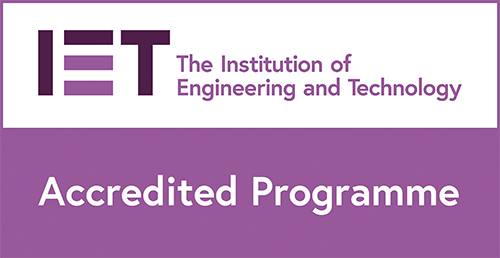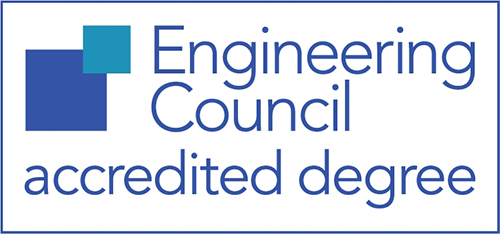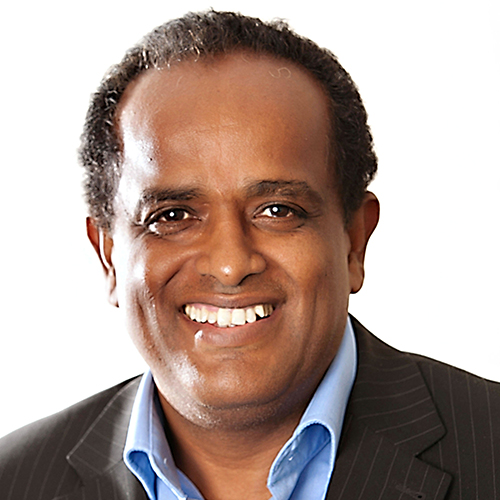Mechanical and Manufacturing Engineering with Industrial Practice, MSc
Our MSc in Mechanical and Manufacturing Engineering with Industrial Practice is ideal for graduates who want to develop into commercially smart, creative, professional engineers.
This master's course helps to transform graduates into innovative professional engineers with a creative approach to problem-solving and a focus on being efficient and cost-effective. It will suit engineering and technology graduates who want to expand their skills or develop managerial careers in engineering or manufacturing.
This two-year Mechanical and Manufacturing Engineering degree with Industrial Practice is in innovative combination of theory and practice. You'll have the chance to put your learning into action though an individual project which runs throughout the year, followed by a placement with a relevant employer. The placement is an ideal opportunity to work and engage with state-of-the-art industrial systems, processes and practices.
You'll emerge from this course as a well-rounded professional engineering manager. With a highly valued combination of in-depth knowledge and work experience, graduates of this course will be in demand anywhere in the world.
This programme has been designed for the International Market.
School
Location
Duration
2 years sandwich
Start month
September; January
Fees information
For fee information related to this course, please see fees section below
What you should know about this course
What you will study
Year 1
Students are required to study the following compulsory modules.
- Individual Research Project (60 credits)
- Research, Planning and Communication (15 credits)
- Academic English for Postgraduates (Engineering)
- Strategy & Management (15 credits)
- Computer Aided Manufacturing (15 credits)
- Advanced Thermo-fluid Applications (15 credits)
- Finite Element Applications (15 credits)
- Advanced Process Improvement Techniques (15 credits)
- Advanced Principles in Lean Manufacturing (15 credits)
Students are required to choose 15 credits from this list of options.
- Modern Materials (15 credits)
- Rapid Prototyping and Manufacturing (15 credits)
Year 2
Students are required to study the following compulsory modules.
- Individual Research Project (60 credits)
- Industrial Practice (60 credits)
About the course team
Lectures are delivered by members of the School of Engineering who have the relevant globally recognised specialism within the respective field. Guest speakers bring additional perspectives from industry or research and keep you updated with the latest industry standards in your discipline.
Come and meet us
We are offering virtual events so that you can still experience how Greenwich could be the right university for you.
Next Open Days
Got a question?
To find out more about our Open Days and Campus Tours or if you need any assistance, please email opendays@gre.ac.uk.
Entry requirements
The University will normally consider applicants with a relevant BSc (Hons, Class 2.2 and above, Mechanical Engineering, Manufacturing Engineering, Materials Science, or similar); or an overseas equivalent.
Applicants without a first degree but with professional and vocational experience (e.g. incorporated engineer or chartered engineer status) may be considered if they demonstrate the potential to succeed on the programme.
There is no requirement for industry experience although students with some work experience will be at an advantage in securing a placement for the Industrial Practice.
For more information, contact courseinfo@greenwich.ac.uk or 020 8331 9000.
You can also read our admissions policy.
Further information about entry
Applicants from other backgrounds may be considered. Please email the Programme Leader at fes-courseinfo@gre.ac.uk.
Available to overseas students?
Yes
Can I use Prior Learning?
Find out more on our Recognition of Prior Learning pages.
How you will learn
Teaching
We use different teaching approaches to give you a varied experience. This includes lectures, interactive paper-led discussions and exercises to encourage creative thinking.
Our taught modules are informed by research. The theory of each topic is accompanied by practical elements covering paper-based, computer-based and hands-on building type challenges.
See full details of our syllabus above.
Class sizes
For specialist modules, our classes are usually limited to 20 students in lab sessions and 40 in lectures. This helps to create familiarity between students and staff and ensure a great learning experience. The modules that run across several courses can have larger classes sizes, which are typically broken down into smaller groups.
Independent learning
Our courses are designed to give you the space for exploratory and independent study. You'll work towards individual and group assignments and undertake the preparation/follow-up work associated with lectures, seminars, integrative assignments and laboratory classes.
We encourage students to take advantage of a range of related extra-curricular opportunities available within the university and elsewhere.
Overall workload
If you are studying full-time, you should expect the workload to be similar to a full-time job. For part-time students, this will reduce in proportion with the number of courses you are studying.
Assessment
Students will be assessed through a variety of methods, such as:
- Classroom presentations, discussions and case-studies
- Critical reviews, looking at new areas of research
- Examinations.
Feedback summary
University policy is to give feedback on assignments within 15 working days of the coursework submission date.
Examination results will be available within 28 days.
Dates and timetables
Each academic year runs from September to June. You can begin the course in September or January.
Full teaching timetables are not usually available until term has started. For any queries, please call 020 8331 9000.
Fees and funding
Your time at university should be enjoyable, rewarding, and free of unnecessary stress. Planning your finances before you come to university can help to reduce financial concerns. We can offer advice on living costs and budgeting, as well as on awards, allowances and loans.
| Full time | Part time | Distance learning | |
|---|---|---|---|
| Home | £16,550 | N/A | N/A |
| International | £21,000 | N/A | N/A |
Accommodation costs
Whether you choose to live in halls of residence or rent privately, we can help you find what you're looking for. University accommodation is available from £126.35 per person per week (bills included), depending on your location and preferences. If you require more space or facilities, these options are available at a slightly higher cost.
Funding your study
There is a range of financial support options available to support your studies, including the Aspire@Greenwich award for study resources that many full-time students will receive.
EU students may be eligible for a bursary to support their study. View our EU bursary to find out more.
Discover more about grants, student loans, bursaries and scholarships. We also provide advice and support on budgeting, money management and financial hardship.
Careers and placements
Will I have a work placement?
The industrial placement is an opportunity to put into practice the knowledge and experience you gain during your first year on the programme. You will engage with current industrial systems, processes, and practices, which contribute to your professional development in the engineering sector.
How long is my placement?
An industrial practice placement should typically last 11 months, with a maximum of 48 weeks, and a minimum of 35 weeks (only if required by the student placement search process).
Mentors
A workplace mentor supports you during your placement, helping you to set objectives and goals, and ensuring you receive appropriate training.
You will also be allocated an academic mentor who monitors your written work. The academic mentor will engage with you to ensure your placement is running smoothly.
What sort of careers do graduates pursue?
This course provides a wide variety of opportunities for mechanical and manufacturing engineers in a range of sectors, from the automotive to the process industries.
Do you provide employability services?
As well as support from the Faculty of Engineering and Science Placements Team, the University partners with an organisation that specialises in guiding students to secure an industrial practice placement. However, it is ultimately the student’s responsibility to secure an appropriate placement. This could be with a local or international employer in a relevant industrial sector.
If a placement is not secured, it is still possible to graduate with an MSc without the endorsement of Industrial Practice.
Support and advice
Academic skills and study support
The course leader has the overall responsibility for your course and will be your first point of contact.
We also allocate you a personal tutor, who you meet soon after you join the department. Their role is to support your personal and academic development and act as your point of contact for queries or problems. Workplace mentors are also allocated in the second year.
Support from the department
We help new students over the first few weeks with our faculty and department induction. This covers the first week of term 1 (September) and term 2 (January). We'll also help you discover the academic and social landscape at Medway Campus.
Mode of study
Select from the dropdown below.
| Course level | |
| UCAS code | |
| Duration | |
| Location |








